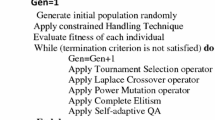Abstract
Finding global optimal solution of a non-linear constrained optimization problem with high complexity is a challenge for the researchers. Now days, real coded genetic algorithm (GA) becomes popular to solve them, due to their diversity preserving mechanism. In recent literature it is proved that for solving constrained optimization problem, the real coded GA (LX-PM) that uses Laplace Crossover and Power Mutation, is much efficient. In this paper an attempt is made to improve the performance of LX-PM, hybridizing with Quadratic Approximation. The efficiency and reliability of the design hybrid algorithm is realized through a set of 15 benchmark test problems.




Similar content being viewed by others
References
Akhtar S, Tai K, Ray T (2002) A socio-behavioral simulation model for engineering design optimization. J Eng Optimization, Taylor & Francis 34(4):341–354
Chootinan P, Chen A (2006) Constraint handling in genetic algorithms using a gradient-based repair method. Comput Operations Res 33:2263–2281
Coello CA, Mezura ME (2002) Constraint-handling in genetic algorithms through the use of dominance-based tournament selection. Adv Eng Inform 16:193–203
Crossley WA and Williams EA (1997) A study of adaptive penalty functions for constrained genetic algorithm based optimization. In AIAA 35th aerospace sciences meeting and exhibit, Reno, Nevada, AIAA paper 97–0083
Deb K (1997) A robust optimal design technique for mechanical component design. In: Dasgupta D, and Michalewicz Z (eds) Evolutionary algorithms in engineering applications, Springer, Berlin, pp 497–514
Deb K (1998) Optimization for engineering design algorithms and examples. Prentice Hall of India, New Delhi
Deb K and Agarwal S (1999) A niched-penalty approach for constraint handling in genetic algorithms. In Proceedings of the ICANNGA, Portoroz, Slovenia
Deep K, Das KN (2008) Quadratic approximation based hybrid genetic algorithm for function optimization. AMC, Elsevier 203:86–98
Deep K, Das Kedar Nath (2009) Performance improvement of real coded genetic algorithm with quadratic approximation based hybridization. Int J Intell Def Support Sys, Indersci 2(4):319–334
Deep K, Thakur M (2007a) A new crossover operator for real coded genetic algorithms. Appl Math Comput 188(1):895–911
Deep K, Thakur M (2007b) A new mutation operator for real coded genetic algorithms. Appl Math Comput 193(1):211–230
Floudas CA, Pardalos PM (1990) A collection of test problems for constrained global optimization algorithms. Belin, Springer
Himmelblau DM (1972) Applied nonlinear programming. McGraw-Hill, New York
Kim JH and Myung H (1996) A two phase evolutionary programming for general constrained optimization problem. In Proceedings of the fifth annual conference on evolutionary programming, San Diego
Kim JH, Myung H (1997) Evolutionary programming techniques for constrained optimization problems. IEEE Trans Evol Comput 1(2):129–140
Kundu S and Osyczka A (1996) Genetic multi-criteria optimization of structural systems. In: Proceedings of the 19th international congress on theoretical and applied mechanics (ICTAM) Kyoto, Japan, IUTAM, Vol of Abstracts 272
Levy AV, Montalvo A (1985) The tunneling algorithm for the global minimization of functions, SIAM. J Sci Stat Comput 6:15–29
Michalewicz Z (1996) Genetic algorithms + data structures = evolution programs, 3rd edn. Springer, Berlin
Michalewicz Z and Naguib FA (1994) Evolutionary optimization of constrained problems. In Proceedings of the 3rd annual conference on evolutionary programming, World Scientific, pp 98–108
Michalewicz Z, Schoenauer M (1996) Evolutionary algorithms for constrained parameter optimization problems. Evol Comput 4(1):1–32
Michalewicz Z (1995)Genetic algorithms, numerical optimization and constraints. In: Echelman LJ (ed) Proceedings of the sixth international conference on genetic algorithms, Los Altos, Morgan Kaufmann, pp 151–158
Myung H, Kim JH (1996) Hybrid evolutionary programming for heavily constrained problems. Biosystems 38:29–43
Saber ME, Ruhul AS, and Daryl LE (2011) Improved genetic algorithm for constrained optimization. In proceeding of international conference on computer engineering & systems (ICCES), pp 111–115
Salkin HM (1975) Integer Programming. Edison Wesley, Amsterdam
Schittkowski K (1987) More examples for mathematical programming codes. Lecture notes in economics and mathematical systems, vol 282
Orvosh D and Davis L (1995) Using a genetic algorithm to optimize problems with feasibility constraints. In Echelman LJ (ed) Proceedings of the sixth international conference on genetic algorithms, pp 548–552
Author information
Authors and Affiliations
Corresponding author
Appendix
Appendix
Problem 1
(Salkin 1975)
Subject to
Solution: x = (4, 88, 35, 150, 0)T, \( f^{*} \left( x \right) = 320 \)
Problem 2
(Himmelblau 1972)
Subject to
.
Solution: x = (5, 1, 5, 0, 5, 10)T, \( f^{*} \left( x \right) = 310 \)
Problem 3
(Schittkowski 1987)
Subject to
Solution: x = (2.246826, 2.381865)T, \( f^{*} \left( x \right) = 1 3. 5 90 8 5 \)
Problem 4
(Michalewicz 1996)
Subject to
Solution: x = (2.330499, 1.951372, −0.4775414, 4.365726, −0.6244870, 1.038131, 1.594227)T \( f^{*} \left( x \right) = 6 80. 6 300 5 7 3 \)
Problem 5
(Floudas and Pardalos 1990)
Subject to
Solution: x = (0.67, 2, 4, 0, 0, 0)T, \( f^{*} \left( x \right) = - 1 1. 9 6 \)
Problem 6
(Levy and Montalvo 1985)
Subject to
Solution: x = (2.3295, 3.1783)T, \( f^{*} \left( x \right) = - 5. 50 7 8 \)
Problem 7
(Floudas and Pardalos 1990)
Subject to
Solution: x = (0.7175, 1.47)T, \( f^{*} \left( x \right) = - 1 6. 7 3 9 1 \)
Problem 8
(Michalewicz 1996)
Subject to
Solution: x = (679.9453, 1,026.067, 0.1188764, −0.3962336)T, \( f^{*} \left( x \right) = 5 1 2 6. 4 9 8 1 \)
Problem 9, 10, 11
(Michalewicz and Naguib 1994)
Subject to
Solution: x = (0, 0) T, (3, \( \sqrt 3 \))T, (4, 0)T, \( f^{*} \left( x \right) = - 1 \)
Problem 12
(Kim and Myung 1996)
Subject to
Solution: x = (0.5, 0.25) T, \( f^{*} \left( x \right) = 0. 2 5 \)
Problem 13
(Kim and Myung 1996)
Subject to
Solution: x = \( \left( {\sqrt {250} ,\sqrt {250} } \right)^{T} \), \( f^{*} \left( x \right) = 0. 5 \)
Problem 14
(Chootinan and Chen 2006)
Subject to
Solution: x = (1.2279713, 4.2453733)T, \( f^{*} \left( x \right) = 0.0 9 5 8 2 5 \)
Problem 15
(Michalewicz and Schoenauer 1996)
Subject to
Solution: x = (14.095, 0.84296)T, \( f^{*} \left( x \right) = -6 9 6 1. 8 1 3 8 1 \)
Rights and permissions
About this article
Cite this article
Deep, K., Das, K.N. A novel hybrid genetic algorithm for constrained optimization. Int J Syst Assur Eng Manag 4, 86–93 (2013). https://doi.org/10.1007/s13198-012-0142-5
Received:
Revised:
Published:
Issue Date:
DOI: https://doi.org/10.1007/s13198-012-0142-5




